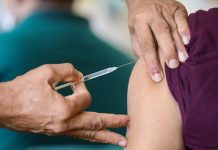Russia’s “Sputnik-V” COVID-19 vaccine produced an antibody response in all participants in early-stage trials, according to results published on Friday by The Lancet medical journal that were hailed by Moscow as an answer to its critics.
The results of the two trials, conducted in June-July this year and involving 76 participants, showed 100% of participants developing antibodies to the new coronavirus and no serious side effects, The Lancet said, as reported by Reuters.
Russia licensed the two-shot jab for domestic use in August, the first country to do so and before any data had been published or a large-scale trial begun.
“The two 42-day trials – including 38 healthy adults each – did not find any serious adverse effects among participants, and confirmed that the vaccine candidates elicit an antibody response,” The Lancet said.
“Large, long-term trials including a placebo comparison, and further monitoring are needed to establish the long-term safety and effectiveness of the vaccine for preventing COVID-19 infection,” it said.
The vaccine is named Sputnik-V in homage to the world’s first satellite, launched by the Soviet Union. Some Western experts have warned against its use until all internationally approved testing and regulatory steps have been taken.
But with the results now published for the first time in an international peer-reviewed journal, and with a 40,000-strong later-stage trial launched last week, a senior Russian official said Moscow had faced down its critics abroad.
“With this (publication) we answer all of the questions of the West that were diligently asked over the past three weeks, frankly with the clear goal of tarnishing the Russian vaccine,” said Kirill Dmitriev, the head of the Russian Direct Investment Fund (RDIF), Russia’s sovereign wealth fund, which has backed the vaccine.
“All of the boxes are checked,” he told Reuters. “Now… we will start asking questions of some of the Western vaccines.”
Dmitriev said at least 3,000 people had already been recruited for the large-scale trial of the Sputnik-V vaccine launched last week, and initial results were expected in October or November this year.
Commenting on the results of the early-stage trials, lead author Dr Naor Bar-Zeev of the International Vaccine Access Center, Johns Hopkins Bloomberg School of Public Health, USA said the studies were “encouraging but small”.
Bar-Zeev, who was not involved in the study, said “clinical efficacy for any COVID-19 vaccine has not yet been shown.”












